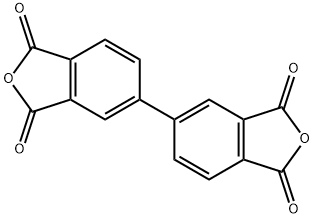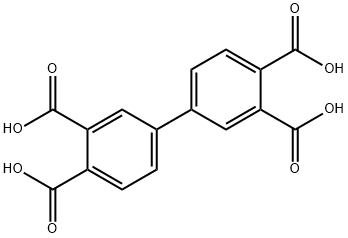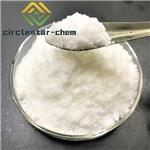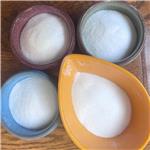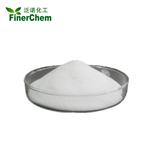Chemical Properties
BPDA (3,3',4,4'-Biphenyltetracarboxylic dianhydride) is a raw material for the polyimide resin component of one of the super-engineering plastics. It is used for many important information and electronic technology products such as mobile phones and copying machines.
Uses
3,3',4,4'-biphenyltetracarboxylic dianhydride be used for the preparation of a polyimide material.
Uses
s-BPDA can be used in the synthesis of high molecular weight aromatic polyamide fibers. It can also be used in the formation of hybrid nanocomposite films.
Preparation
The preparation of 3,3',4,4'-Biphenyltetracarboxylic dianhydride is as follows:In a nitrogen atmosphere, add N-(3-N,N-dimethylamino-propyl)-4-chlorophthalimide (26.65g, 0.1moL),Zinc powder (3.25g, 0.05moL), anhydrous NiCl2 (127.5mg, 1mmoL),Triphenylphosphine (250mg, 1mmoL) and 70 mL of anhydrous DMAc were stirred at 50°C for 24 hours, and 55mL of solvent DMAc was recovered under reduced pressure. Add 80g of xylene to the system and reflux (recrystallize), filter out the inorganic matter, the clarified filtrate will be cooled and precipitated, filtered, and vacuum dried for 10 hours. 21.8g of 3,3',4,4'-biphenylbisimine was obtained with a yield of 94%. In a 100mL reaction flask, add 4.62g (0.01mol) of the above 3,3',4,4'-biphenylbisimine and 9g of 20% sodium hydroxide aqueous solution, and heat to reflux for 24 hours. Filter and adjust pH=1 with concentrated hydrochloric acid to obtain 3,3’,4,4’-biphenyltetracarboxylic acid. After filtering, wash with water three times and reflux with water with 20mL trimethylbenzene.2.85g of white 3,3′,4,4′-biphenyltetracarboxylic dianhydride was obtained, the yield was 97%.

Application
3,3′,4,4′-biphenyltetracarboxylic dianhydride (BPDA) and 3,3′- and 4,4′-diaminodiphenylsulfones enable to prepare homo- and copolyimides. 3,3',4,4'-Biphenyltetracarboxylic dianhydride is commonly employed to synthesized the aromatic polyimide fibers which is one member of high performance fibers with high strength, high modulus, high and low temperature resistance, and radiation resistance. BPDA could be used to synthesize a series of hyper-cross-linked polymers (HPB-s) with waste polystyrene (WPS) foam. HPB-s has promising potential in purifying dye wastewater[1-2].
General Description
3,3′,4,4′-Biphenyltetracarboxylic dianhydride (s-BPDA) is a rigid symmetric polyamide with a diamine having a long distance between amine groups and reactive endgaps.
Flammability and Explosibility
Non flammable
Advantages
1.Excellent thermal stability
2.Good chemical resistance
3.Stable mechanical properties
4.Polyimide does not require the addition of flame retardants to prevent combustion.
References
[1] Zhao M, et al. Porous Adsorbents Cross-Linked with Waste Polystyrene Foam and 3,3′,4,4′-Biphenyltetracarboxylic Acid Dianhydride for the Effective Removal and Enrichment of Cationic Dyes. ACS Applied Polymer Materials, 2023.
[2] Zhang Q, et al. Morphology of polyimide fibers derived from 3,3′,4,4′-biphenyltetracarboxylic dianhydride and 4,4′-oxydianiline. Journal of Applied Polymer Science, 2004; 93: 669-675.
